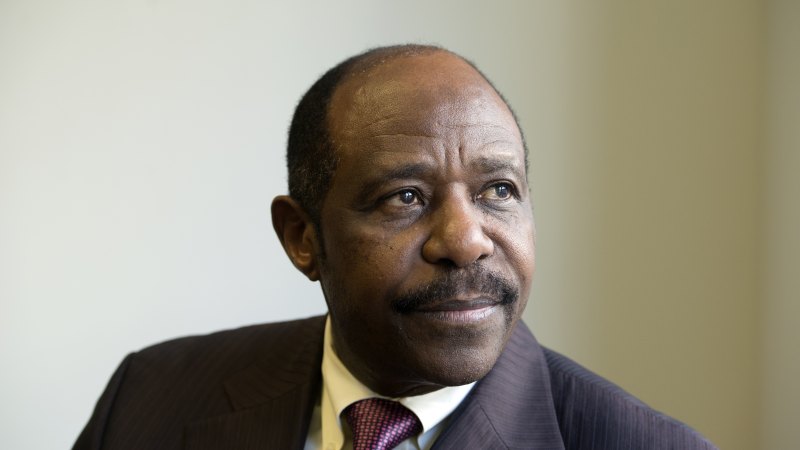
Real-life hero who inspired Hotel Rwanda released from prison
March 24, 2023Nairobi: Rwandan authorities will release human rights activist Paul Rusesabagina, whose life inspired the Hollywood film Hotel Rwanda about the country’s 1994 genocide, a Rwandan government spokeswoman said Friday.
The one-time hotel manager was sentenced to 25 years on terrorism charges in 2021 after authorities tricked him into boarding a plane that secretly took him to Kigali, Rwanda’s capital.
Paul Rusesabagina in 2018.Credit:The Washington Post
Spokeswoman Yolande Makolo said Rusesabagina would be released on Saturday (Rwanda time). She said the sentences of Callixte Nsabimana and 18 others convicted in the same case had been commuted after requests for clemency.
She said the US had “created dialogue” on the issue, but continued: “Serious crimes were committed, for which they were convicted. Under Rwandan law, commutation of sentence does not extinguish the underlying conviction.”
News of the release was first reported by the Semafor website.
Rusesabagina’s case cast a spotlight on growing opposition to Rwandan President Paul Kagame, once praised for ending Rwanda’s genocide and for his focus on developing the tiny East African nation, but increasingly criticised for his authoritarian rule, the abduction of Rusesabagina, and accusations of support for rebels in the neighbouring Democratic Republic of Congo – something the government has denied.
Hollywood actor Don Cheadle played Rusesabagina in the hit movie Hotel Rwanda, which was inspired by his experiences as a hotel manager protecting Tutsi guests from Hutu death squads. Rusesabagina, a Belgian citizen and US permanent resident, was awarded the US Presidential Medal of Freedom – the country’s highest civilian honour – in 2005.
Rusesabagina and Kagame were once cordial, but over the years, Rusesabagina became a vocal critic of Kagame, saying he was stifling political opposition. The president hit back by accusing Rusesabagina of exaggerating his role during the genocide.
In 2020, Rwanda lured Rusesabagina onto an aircraft that he thought was going to Burundi but that landed in Kigali instead. There, he was arrested and faced a battery of charges connected with founding and supporting an opposition group – the National Liberation Front – that was blamed for attacks that had killed civilians.
During his trial, the judge cited as evidence of his guilt a 2018 video in which Rusesabagina says that “the time has come for us to use any means possible to bring about change in Rwanda, as all political means have been tried and failed.”
Paul Rusesabagina when he arrived for a bail hearing in September 2020.Credit:AP
The conviction sparked a storm of global criticism, with more than three dozen US senators urging Kagame to release Rusesabagina on humanitarian grounds and the launching of high-profile campaign for his release involving celebrities, political leaders and rights organisations.
Rusesabagina’s release comes after a noticeable cooling of relations between Kigali and Washington.
“This has been one of two issues that has really soured relations with Washington: the Rusesabagina renditioning and its active support for the M23 rebels. I think Kagame finally realised it wasn’t a good idea to make an enemy of the US government,” said Michela Wrong, author of Do Not Disturb, a book about the killing of Rwanda’s former top spy after he fell out with Kagame.
US statements about Rwanda have become direct and forceful, she said. They have moved from criticising Kigali for supporting the M23 rebels across the border in Congo to demanding that Rwanda stop deploying troops there.
President George W Bush awarded Paul Rusesabagina the Presidential Medal of Freedom Award in 2005. Credit:AP
Rwanda has denied supporting the rebels – blamed for numerous mass killings of civilians – but relations between the two neighbours are extremely tense. Rwanda fired at a Congolese jet in January.
Phil Clark, a professor of international politics at SOAS University of London, observed part of Rusesabagina’s trial in Kigali. There were noticeable irregularities in the trial, he said, and the manner of Rusesabagina’s arrest was problematic.
But he also noted that much of the evidence Rwanda produced showing that Rusesabagina had financed a rebel movement came from the FBI and Belgian authorities. Both the US and Belgium provided Western Union and other bank transfer evidence showing money moving from Rusesabagina’s account to active rebels, he said.
Neither the FBI nor the Belgian police immediately responded to requests for comment. Rusesabagina’s lawyers and a family spokeswoman did not respond to messages seeking comment.
Clark said the case brought unwelcome scrutiny at a time when Rwanda is seeking to strengthen its international profile. It is expanding peacekeeping missions across Africa, heading the Commonwealth of Nations, and has struck a deal with Britain to take migrants that have entered the country illegally – a plan that has sparked increased scrutiny of Rwanda’s human rights record.
Kigali has received about $US147 million ($221 million) in bilateral aid from the US, Clark said, including US military support for Rwandan peacekeepers across Africa. Those figures fluctuate by year but have been as high as $US33 million annually.
Kigali may have calculated that it had enough wins, Clark said: showing it can project power across international borders by abducting a dissident and getting information about funding for the National Liberation Front into the public domain.
“Finally, this case became too burdensome for them,” Clark said.
The Washington Post
Get a note directly from our foreign correspondents on what’s making headlines around the world. Sign up for the weekly What in the World newsletter here.
Most Viewed in World
From our partners
Source: Read Full Article





